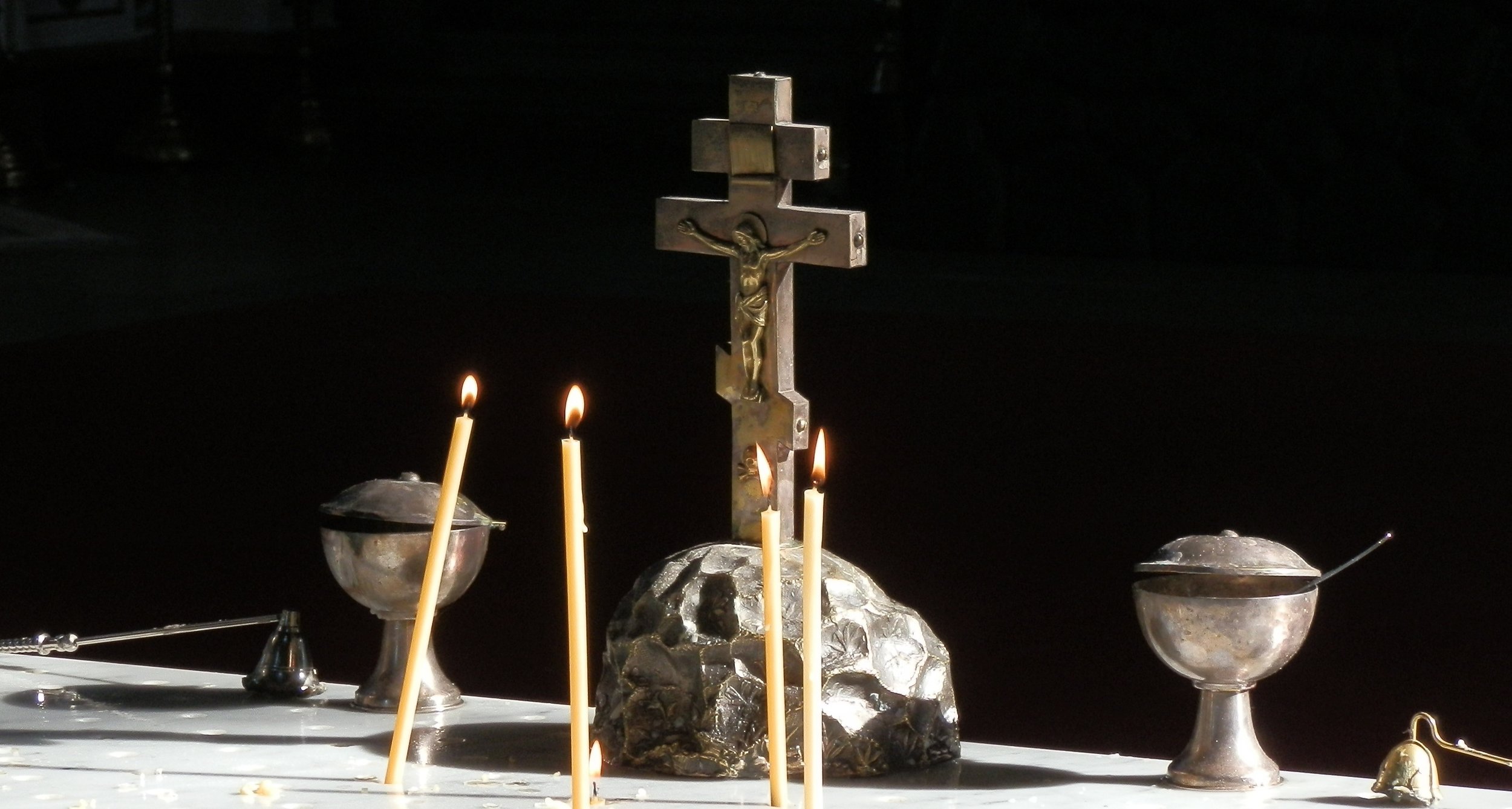Healing Atonement
Eusebius of Caesarea (c.240 - 340 AD)
An old clay oil lamp from Nazareth, Israel. Photo credit: Olivia Armstrong.
The Writings of Eusebius of Caesarea
Eusebius of Caesarea, Oration in Praise of Constantine, chapter 15 Gives three reasons for Jesus' death and resurrection: 1) to defeat death (15:9); 2) to manifest divine power in a human body (15:10); 3) as a sacrifice as a ransom for the whole human race (15:11 - 13). To support his third reason, Eusebius quotes John 1:29 and Isaiah 53:4 - 6 and says Jesus was a sacrifice and offering. Patristic use of those terms meant cleansing and purification of us, not appeasement of divine retributive justice. Thus, Eusebius says (in 15:11) that the death of Jesus abolished the power of impure and unholy spirits over us, as well as delusive errors. His Origenist intellectualism shows through. Nevertheless, in Eusebius' view, the atonement changes us; it does not appease God. See also Isaiah's Understanding of Sacrificial Animals on the the Anastasis blog.
Eusebius of Caesarea, Proof of the Gospel, book 1, chapter 10. Eusebius compares Greek and Jewish sacrifices, and explains why Jewish sacrifices involved animals and blood. He then expands on the Jewish sacrifices, connecting them to Jesus as a sacrifice. Eusebius does use "victim" language because he does not focus on the role of the Jewish priests, but only the animals. This can give misleading impressions due to the limited scope of Eusebius’ treatment of Scripture. But, importantly, Eusebius coordinates the Jewish sacrifices with what human nature requires: "a life that represented their own nature." That is, starting from Cain and Abel, offering sacrifices represented to God an offering of yourself, and your devotion to God. The sacrifices were not compensatory for your misdeeds. This carried forward in the formal Jewish sanctuary sacrifices. They were expressions of devotion, and became vehicles of cleansing. Eusebius says, “there was need of great stress on the cleansing of the sons of men, they thought that a ransom was due to the source of life and soul in return for their own salvation. And then as they had nothing better or more valuable than their own life to sacrifice, in place of it they brought a sacrifice through that of the unreasoning beasts, providing a life instead of their own life.” Thus were the sacrifices both a medical substitute and a medical representative.
Eusebius of Caesarea, Proof of the Gospel, book 3, chapter 2. Eusebius writes, “In this he shows that Christ, being apart from all sin, will receive the sins of men on himself. And therefore he will suffer the penalty of sinners, and will be pained on their behalf; and not on his own.” Brian Arnold, Penal Substitution in the Early Church (The Gospel Coalition, April 13, 2021) argues that this was penal substitution and penal satisfaction as in the teachings of the traditional Protestant Reformers like Calvin. However, Arnold fails to mention that Eusebius quotes from the Greek Septuagint Text (LXX) version of Isaiah 53:10, which is decidedly medical in its expression:
“The Lord also is pleased to purify him from his stroke… And the Lord wills to take away from the travail of his soul, to shew him light."
We have discussed in tandem with the Masoretic Text (MT) expression, seeking to explain both textual variants as rooted in Isaiah’s understanding of the Jewish sacrificial system. See here for all our blog posts exegeting Isaiah 53. Arnold nevertheless claims:
“Here is the essence of Penal Substitution—Jesus took our penalty on himself so that we might be spared God’s wrath. Many scholars have failed to see the explicit connection between the atonement and penalty in the early church, and yet here is a clear example.”
But the penalty that Eusebius understood was the condition of being mortal, and subject to death. Mortality and death were the penalty of Adam and Eve’s fall into the corruption of sin. So Jesus shared in our mortality and death, not to deflect “God’s wrath” from us, “so that we might be spared God’s wrath,” as Arnold wishes to interpret. In point of fact, we are all still quite mortal, and we all die. But Jesus shared in our mortality and death because we needed him to enter into our fallen human condition and nature, to push through it and emerge “cleansed” on the other side, in his resurrection. Thus Eusebius says:
“Since then the Lord, the Almighty God, willed to cleanse Him from this stroke, and to show Him light, if He willed He would most certainly do what He willed; for there is nothing that He wills which is not brought to pass: but He willed to cleanse Him and to give Him light; therefore he accomplished it, He cleansed Him and gave Him light.”
That is, Jesus entered into the conditions of being fallen, and entering even death, so he could be “cleansed” from death and mortality in his resurrection. Brian Arnold is mistaken. Eusebius is not teaching Penal Substitution. He is teaching Medical Substitution.
Sources of Atonement Theology
These resources explore the foundation of “Medical Substitution” as the best understanding of the Bible, and the original understanding of the church. There are also links to books, web articles, etc. from representatives of the three broad Christian traditions.





